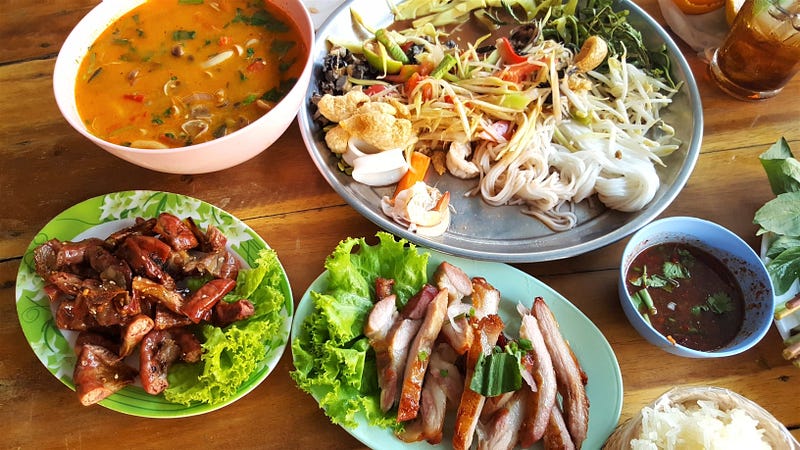The Art of Simple Cooking: Earning Complexity in Flavor
Written on
Chapter 1: The Contrast of Culinary Cultures
In observing Anthony Bourdain's various shows, from No Reservations to Parts Unknown, I've noticed a distinct contrast between Asian and European cuisines. Specifically, the differences between Southeast Asian and Mediterranean fare stand out.

Photo by Jerome Jome on Unsplash
While I often think of the comparison between Malaysian and Italian dishes, similar parallels can be drawn between Korean and Spanish cuisines as well. This led me to contemplate the essence of simple cooking, where the focus is on allowing the ingredients to shine. For instance, a steak seasoned solely with salt and pepper, or handmade pasta dressed simply in cheese, exemplifies this approach. The emphasis lies on the quality of the ingredients rather than elaborate seasonings.
This sentiment resonates with my uncle, who often contrasts his culinary experiences in Canada with those in England. He fondly recalls the fresh ingredients delivered daily from the Mediterranean, emphasizing their significance in his cooking.
Consider balsamic vinegar, which requires at least 12 years to mature, or culatello, aged for a minimum of two years. Consumed as they are, these items offer incredible flavors without the need for added sauces. The passage of time itself becomes a key ingredient, which could explain the high price tags associated with such fine products—replicating them quickly is nearly impossible.
However, my encounters with Malaysian, Thai, Chinese, or Korean cuisines diverge from this simplicity. Although many dishes boast rich flavors, they often rely heavily on sauces that overshadow the intrinsic tastes of the ingredients. This comparison can also be made with Western condiments like mayonnaise, ketchup, mustard, and gravy.
Initially, I believed these condiments enhanced flavor, but I now suspect they merely disguise the lackluster tastes of mass-produced, chemically laden ingredients. While I appreciate their affordability, it's undeniable that they often lack genuine taste.
Consider the groceries you buy. Are your egg yolks vibrant orange or a dull yellow? How does your beef look—bright red or the pale hue of grain-fed cattle? Are you aware if your fish or meat has been artificially colored?
One reason I enjoy cooking is the control it provides. I prefer handpicking my groceries, often visiting different markets for vegetables, meats, and fruits. While this might seem inefficient, it ultimately enhances my cooking experience.
Reflecting on the daily ritual of cooking, I realized it has been a part of my life since I left home at 18. Surprisingly, I found that not everyone shares this habit; many of my peers shy away from cooking due to perceived time constraints. Although preparing meals requires a commitment, I previously regarded it as time well spent.
I understand the appeal of services like Instacart for grocery shopping. I also see why entrepreneurs, like Paul Graham and Naval Ravikant, advise founders to prioritize their businesses over cooking. Yet, I struggle to comprehend how relinquishing control over one's health can be justifiable.
Cooking extends beyond health considerations. My preference for uncomplicated recipes isn't solely about controlling flavor (i.e., the freedom to mix sauces); it's about preserving the integrity of what I consume.
I prioritize the quality of the food I eat over cheap or trendy meals. Many restaurants serve subpar food drenched in sauces. I accept this because dining out often prioritizes the experience over the dish's integrity. The ambiance, company, and purpose of the meal contribute significantly to the overall experience, whereas cooking at home puts the focus squarely on the food and the process.
The journey begins with grocery shopping, rooted in the principles of simple cooking. A basic meal of rice, meat, and vegetables (or carbs, protein, and fats) doesn't need extravagant flavors; quality ingredients suffice.
For me, flavor transcends mere seasoning. As a Korean, what Westerners identify as umami aligns with the fundamental concept of "taste" in my culture. This explains why Koreans often smuggle instant noodles, kimchi, and gochujang (Korean chili paste) when traveling abroad—these flavors are often absent in other cuisines.
Simple cooking celebrates the ingredients, allowing their inherent quality to shine through. Only after mastering this foundation should one consider adding complexity.
Complexity, in my view, equates to flavor. This is where the sauces that can elevate or diminish the various Asian cuisines I mentioned come into play. It's not about shunning flavor but recognizing the elegance of simple cooking and the necessity of a solid foundation. Quality ingredients are non-negotiable—poor choices lead to subpar results.
In this context, complexity is earned. The expectation shouldn't be to douse everything in ketchup to mask the flaws of the food. This principle parallels many aspects of life; businesses often cover weaknesses with flashy acquisitions, new hires, or elaborate marketing campaigns. The same applies to self-promotion on social media or the allure of a luxury car, which can hide deeper flaws.
Ultimately, embrace simple cooking before introducing complexity.
Chapter 2: Earning Complexity Through Knowledge
The first video discusses a surefire method to achieve complexity in your cooking, particularly for Document-Based Questions (DBQ) and Long Essay Questions (LEQ).
The second video elaborates on strategies for earning complexity in DBQ and LEQ contexts, emphasizing the importance of understanding the process.